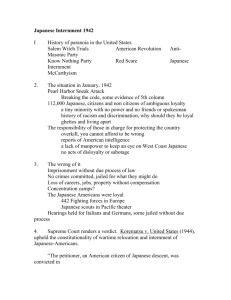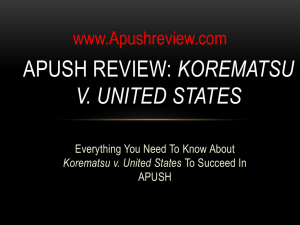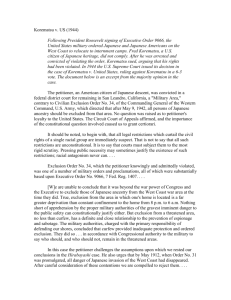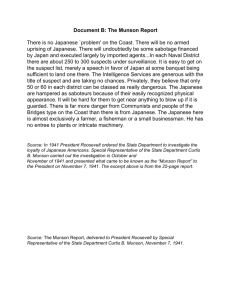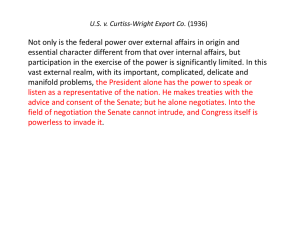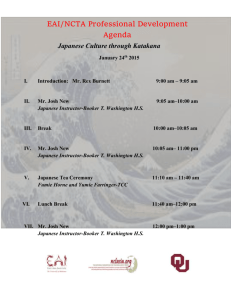Japanese Internment Documents Japanese internment Soc
advertisement
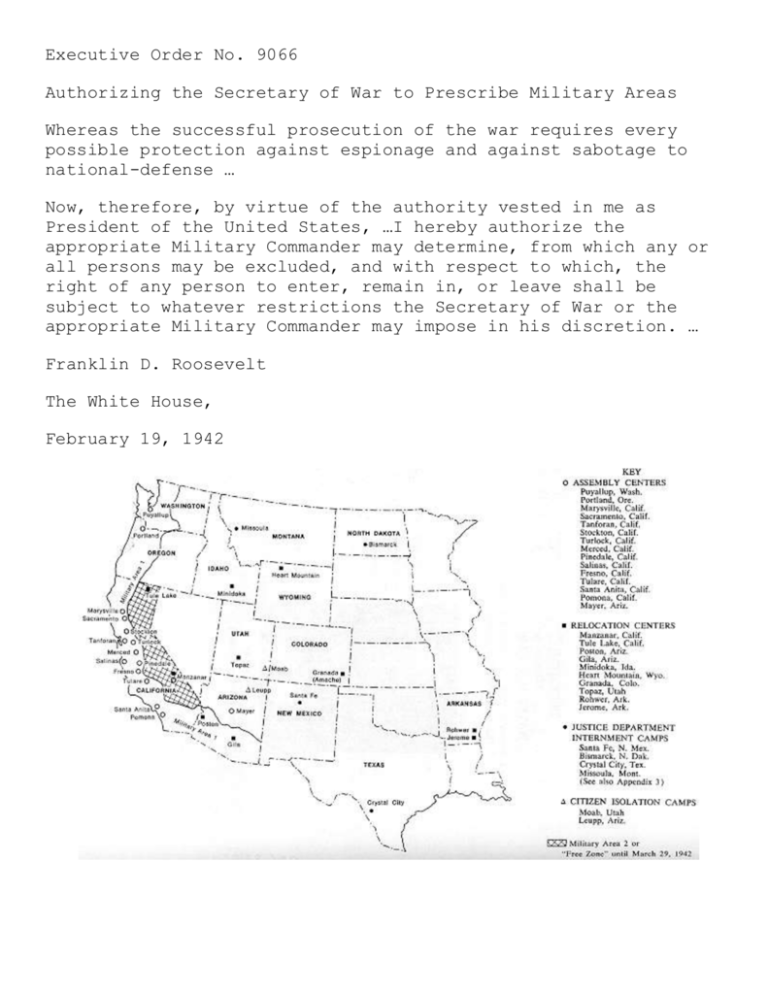
Executive Order No. 9066 Authorizing the Secretary of War to Prescribe Military Areas Whereas the successful prosecution of the war requires every possible protection against espionage and against sabotage to national-defense … Now, therefore, by virtue of the authority vested in me as President of the United States, …I hereby authorize the appropriate Military Commander may determine, from which any or all persons may be excluded, and with respect to which, the right of any person to enter, remain in, or leave shall be subject to whatever restrictions the Secretary of War or the appropriate Military Commander may impose in his discretion. … Franklin D. Roosevelt The White House, February 19, 1942 Korematsu vs US – (1944) Majority Opinion: . . . We cannot say that the war-making branches of the Government did not have ground for believing that in a critical hour such persons could not readily be isolated and separately dealt with, and constituted a menace to the national defense and safety, which demanded that prompt and adequate measures be taken to guard against it. It was because we could not reject the finding of the military authorities that it was impossible to bring about an immediate segregation of the disloyal from the loyal that we sustained the validity of the curfew order as applying to the whole group. That there were members of the group who retained loyalties to Japan has been confirmed by investigations made subsequent to the exclusion. Approximately five thousand American citizens of Japanese ancestry refused to swear unqualified allegiance to the United States and to renounce allegiance to the Japanese Emperor, and several thousand evacuees requested repatriation to Japan. It is said that we are dealing here with the case of imprisonment of a citizen in a concentration camp solely because of his ancestry, without evidence or inquiry concerning his loyalty and good disposition towards the United States. Our task would be simple, our duty clear, were this a case involving the imprisonment of a loyal citizen in a concentration camp because of racial prejudice. Regardless of the true nature of the assembly and relocation centers — and we deem it unjustifiable to call them concentration camps with all the ugly connotations that term implies — we are dealing specifically with nothing but an exclusion order. To cast this case into outlines of racial prejudice, without reference to the real military dangers which were presented, merely confuses the issue. Korematsu was not excluded from the Military Area because of hostility to him or his race. He was excluded because we are at war with the Japanese Empire, because the properly constituted military authorities feared an invasion of our West Coast and felt constrained to take proper security measures, because they decided that the military urgency of the situation demanded that all citizens of Japanese ancestry be segregated from the West Coast temporarily, and finally, because Congress, reposing its confidence in this time of war in our military leaders — as inevitably it must — determined that they should have the power to do just this. There was evidence of disloyalty on the part of some, the military authorities considered that the need for action was great, and time was short. We cannot — by availing ourselves of the calm perspective of hindsight — now say that at that time these actions were unjustified. Korematsu vs US (1944)- Dissenting Opinion: This exclusion of "all persons of Japanese ancestry, both alien and non-alien," from the Pacific Coast area on a plea of military necessity in the absence of martial law ought not to be approved. Such exclusion goes over "the very brink of constitutional power" and falls into the ugly abyss of racism. . . . In excommunicating them without benefit of hearings, this order also deprives them of all their constitutional rights to procedural due process. Yet no reasonable relation to an "immediate, imminent, and impending" public danger is evident to support this racial restriction which is one of the most sweeping and complete deprivations of constitutional rights in the history of this nation in the absence of martial law. . . . No one denies, of course, that there were some disloyal persons of Japanese descent on the Pacific Coast who did all in their power to aid their ancestral land. Similar disloyal activities have been engaged in by many persons of German, Italian and even more pioneer stock in our country. But to infer that examples of individual disloyalty prove group disloyalty and justify discriminatory action against the entire group is to deny that under our system of law individual guilt is the sole basis for deprivation of rights. No adequate reason is given for the failure to treat these Japanese Americans on an individual basis by holding investigations and hearings to separate the loyal from the disloyal, as was done in the case of persons of German and Italian ancestry . . . Racial discrimination in any form and in any degree has no justifiable part whatever in our democratic way of life. All residents of this nation are kin in some way by blood or culture to a foreign land. Yet they are primarily and necessarily a part of the new and distinct civilization of the United States. They must accordingly be treated at all times as the heirs of the American experiment and as entitled to all the rights and freedoms guaranteed by the Constitution. Images: Source Courtesy of Auburn White River Valley Museum (1941-1946)
